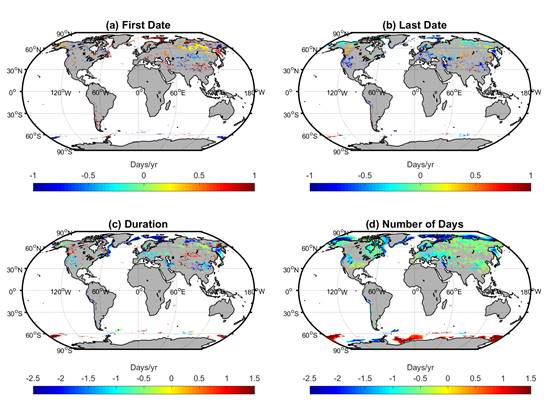Professor Zhang Tingjun's team from the College of Earth and Environmental Sciences, Lanzhou University found that the earth's cryosphere is shrinking at an average rate of 87000 square kilometers per year. The study was recently published inEarth's futureof American Geophysical Association, and Associate Professor Peng Xiaoqing was the first author of the paper.
Under the background of global warming, the cryosphere is one of the most sensitive zones to climate change. The cryosphere is the world's largest reservoir of freshwater resources. In some mountainous areas, dwindling glaciers threaten the supply of drinking water. The change of cryosphere has an important impact on the energy exchange, water resources, ecology and disaster process of the earth atmosphere system. Therefore, it is particularly important to explore the response of cryosphere change to climate change.
In the past, many scientists have recorded the changes of single factor, such as glacier retreat, reduction of snow cover area, annual average ground temperature rise of permafrost, and reduction of Arctic Sea ice area due to climate change, but they have not discussed the changes of the cryosphere as a whole.
In order to effectively quantify the response of the earth's surface cryosphere to climate change, Associate Professor Peng Xiaoqing systematically explored the global cryosphere range change and its response to climate change from 1979 to 2016 through satellite remote sensing data, reanalysis data and observation data. The results show that during 1979-2016, the global cryosphere area decreased by 87±11 thousand km2annually, with an average decrease of 102±10 thousand km2in the northern hemisphere and an average increase of 15±4 thousand km2in the southern hemisphere. The initial date of cryosphere freezing was postponed by 3.6 days (0.95 days/10 years), and the final date was advanced by 5.7 days (1.5 days/10 years). The duration and days of cryosphere freezing decreased at the rate of 2 days 10 years.

Figure 1. Variation trend of global cryosphere from 1979 to 2016.

Figure 2. Phenological characteristics of the global cryosphere from 1979 to 2016.
The above studies have made clear the overall distribution characteristics of the earth's surface cryosphere and its response to climate change. It is the first time at home and abroad to systematically study the cryosphere as a whole and explain the temporal and spatial variation characteristics of the global change of the cryosphere. The results can be used to further study the response mechanism of cryosphere to climate change and provide basic support for the research of ecosystem and carbon cycle. The research was supported by national key R&D (2019YFA0607003), class A leader of Chinese Academy of Sciences (XDA20100313), and youth program of National Natural Science Foundation of China (41801028).
Relevant achievements have also been reported by relevant magazines and media:
Science and Technology Daily:
http://digitalpaper.stdaily.com/http_www.kjrb.com/kjrb/html/2021-07/07/content_471260.htm?div=-1
Science official accounts:
https://mp.weixin.qq.com/s/x4130DX9vTgBph22aTjq-g
AGU:
https://news.agu.org/press-release/earths-cryosphere-shrinking-by-87000-square-kilometers-per-year/
Phys.org:
https://phys.org/news/2021-07-earth-cryosphere-square-kilometers-year.html
ScienceDaily:
https://www.sciencedaily.com/releases/2021/07/210701195242.htm
SciTechDaily:
https://scitechdaily.com/earths-cryosphere-shrinking-by-87000-square-kilometers-per-year-a-major-global-change/
The Weather Channel, India:
https://weather.com/en-IN/india/environment/news/2021-07-03-earths-cryosphere-shrank-by-87000-square-km-in-last-37-years
CTV NEWS:
https://www.ctvnews.ca/climate-and-environment/earth-s-cryosphere-averages-net-loss-of-87-000-sq-km-per-year-study-shows-1.5495016
Article link:
https://agupubs.onlinelibrary.wiley.com/doi/10.1029/2020EF001969